-
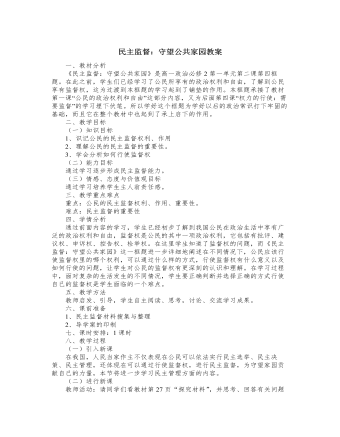
人教版高中政治必修2民主监督:守望公共家园教案
一、教材分析《民主监督:守望公共家园》是高一政治必修2第一单元第二课第四框题。在此之前,学生们已经学习了公民所享有的政治权利和自由,了解到公民享有监督权,这为过渡到本框题的学习起到了铺垫的作用。本框题承接了教材第一课“公民的政治权利和自由”这部分内容,又为后面第四课“权力的行使:需要监督”的学习埋下伏笔。所以学好这个框题为学好以后的政治常识打下牢固的基础,而且它在整个教材中也起到了承上启下的作用。二、教学目标(一)知识目标1、识记公民的民主监督权利、作用2、理解公民的民主监督的重要性。3、学会分析如何行使监督权(二)能力目标通过学习逐步形成民主监督能力。(三)情感、态度与价值观目标通过学习培养学生主人翁责任感。三、教学重点难点重点:公民的民主监督权利、作用、重要性。难点:民主监督的重要性
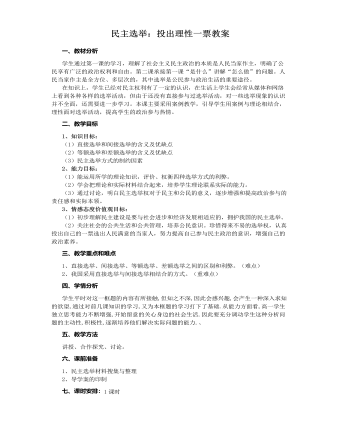
人教版高中政治必修2民主选举:投出理性一票教案
1、第一,材料一和材料二的选举方式有什么异同?(1)相同点:①都采用了演讲和答辩等形式,都带有竞选的性质;②都采用无记名、直接选举的方式进行投票选举;③都属于差额选举。(2)不同点:①材料一是对村主任进行的正式选举,结果是直接产生村主任,材料二是对镇长候选人进行的选举,结果只是确定镇长候选人,镇长人选还有待进行正式选举;②材料一是全体村民都参加选举,材料二是各户派代表参加选举;③材料二比材料一更强调竞选的方式。第二,你还知道哪些选举方式?除了直接选举外,还有间接选举、等额选举、差额选举等。第三,你能对这几种选举方式的意义和效果,作出自己的评估吗?这是学习中要探究的问题,这里不一定能回答出来,等到学完本框内容后,可以得出比较明确的答案。第四,材料三给了你什么启示?这个问题不要求统一的答案,能讲出一两点即可。提示如下:(1)新中国成立后,选举制度经历半个多世纪的发展,正在逐步走向完善;
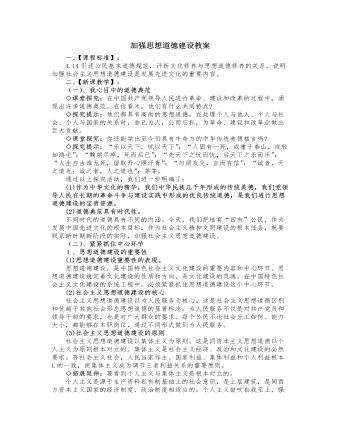
人教版高中政治必修3加强思想道德建设教案
(2)社会主义思想道德体系应该与社会主义法律规范相协调。法治和德治,从来都是相辅相成、相互促进的。法治以法律的权威性和强制性规范社会成员的行为;德治以道德的说服力和感召力提高社会成员的思想认识和道德觉悟。建设中国特色社会主义,既要加强社会主义法制建设,依法治国;也要加强社会主义思想道德建设,以德治国。◇课堂探究:你能否引述与上述道德规范相关法律条文。◇探究提示:上述道德规范见诸很多法律当中,例如:2O()5年4月27日颁布的《中华人民共和国公务员法》规定:公务员应当“忠于职守,勤勉尽责,服从和执行上级依法作出的决定和命令”“遵守纪律,恪守职业道德,模范遵守社会公德。”修订后的《中华人民共和国婚姻法》规定:“夫妻应当互相忠实,互相尊重;家庭成员间应当敬老爱幼,互相帮助,维护平等、和睦、文明的婚姻家庭关系。”
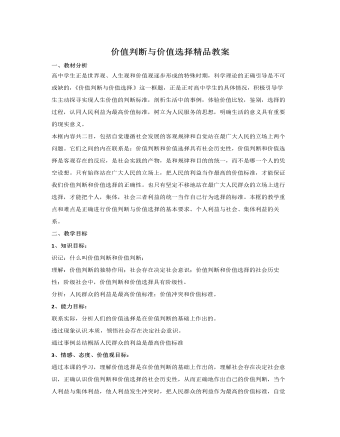
人教版高中政治必修4价值判断与价值选择精品教案
南极大地的水陆交接处,全是滑溜溜的冰层或者尖锐的冰棱。企鹅没有可以用来攀爬的前臂,也没有可以飞翔的翅膀,如何从水中上岸?纪录片《深蓝》展示,企鹅在将要上岸之时,要从海面潜入海中,沉潜到适当的深度,借用水的浮力,迅猛向上,飞出一道弧线,落于陆地之上。企鹅的沉潜是为了蓄势,看似笨拙,却富有成效。人生又何尝不是如此?沉潜绝非沉沦,而是勇敢、智慧、自强。如果我们在困难面前能沉下气来,不被“冰棱”吓倒,不被浮华迷惑,专心致志,自强不息,积聚力量,并抓住恰当的机会反弹向上,毫无疑问,我们就能成功登陆!反之,总是随波浮沉,或者怨天尤人,注定就会被命运的风浪所玩弄,直至精疲力竭。结合上述材料,运用《生活与哲学》知识对“价值观是人生的重要向导,有价值观的人生才是更美的人生”加以评析。7、有两名畜牧兽医专业毕业的大学生应聘到农村养猪场担任技术总监后,大力推广使用生态养猪法和中草药防疫技术,使养猪场步入了良性发展轨道。

新人教版高中英语必修3Unit 2 Morals and Virtues-Discovering Useful Structure教学设计
1. 表示时间。Hearing these stories, I’m skeptical about the place. = When I heard these stories. . . 2. 表示原因。Not knowing his address, I can’t send this book to him. = Because/Since/As I don’t know his address. . . 3. 表示结果。His father died, leaving him a lot of money. =. . . and left him a lot of money4. 表示条件。Going straight down the road, you will find the department store. = If you go straight down the road. . . 5. 表示让步。Being tired, they went on working. =Although they were tired. . . 6. 表示行为方式、伴随情况或补充说明。He lay on the grass, staring at the sky for a long time. =. . . and stared at the sky for a long time注意:非谓语动词作状语时, 如所提供的动词不能和句子中的主语保持一致, 动词-ing形式必须有自己的逻辑主语, 通常由名词或代词来担任, 这就是独立主格结构。The last bus having gone, we had to walk home. (having gone的逻辑主语是the last bus, 而不是we)Weather permitting, the football match will be played on Friday. (permitting的逻辑主语是time, 而不是the football match)Step 7 Practice1. ________(study) hard, you are sure to get first prize. 2. People use plastic in their daily life, _______(leave) large amounts of waste. 3. ________(work) hard at your lessons, you are to succeed. 4. The old man, ____________(work) abroad for twenty years, is on the way back to his motherland. 5. ______________(finish) his homework, he was playing on the playground. Answers: 1. Studying 2. leaving 3. Working 4.having worked 5. Having finishedStep 8 HomeworkFinish the homework on Page 22.

新人教版高中英语必修3Unit 2 Morals and Virtues-Reading and Thinking教学设计
The topic of this part is “Learn to make choices in life”.The Listening & Speaking & Talking part aims at the moral dilemmas, and this part is about making choices in life. The heroin is Lin Qiaozhi, a famous medical scientist, made a great contribution to our country’s medical care. Most importantly, her life experience can inspire our students whether in studying or the development of career. she had moral dilemmas and life choices, which are similar to the students who will step into society. Besides, Lin has quite good virtues like kindness, self-improvement, insistence, job-loving , generosity and responsibility, which is worth being learned.Concretely, this article is a biography about Lin Qiaozhi. The article tells her whole life according the timeline, among which the life choices is emphasized. For example, whether married or chased her dream, returned home or stayed abroad, family or public, her choices all reflected her faith, spirit, responsibility and devotion.1. Fast reading to get the detailed information about Lin Qiaozhi; careful reading to do the deductive information.2. Learn the reading skills--deductive judgement according the context.3. Study the structure features and language features. 4. Communicate about Lin’s life choices and reflect their own life choices.1. Learn the reading skills--deductive judgement according the context.2. Study the structure features and language features.3. Communicate about Lin’s life choices and reflect their own life choices.Step 1 Lead in---Small talkWhat are some important life choices?Importance choices: university study, jobs and marriage partners. Because they can determine our future.

新人教版高中英语必修3Unit 3 Diverse Cultures-Listening &Speaking&Talking教学设计
1. In Picture 1 and Picture 2, where do you think they are from? How do you know?From their wearings, we can know they are from ethnic minority of China--- Miao and Dong.Picture 1, they are playing their traditional instrument lusheng in their traditional costumes.Picture 2. the girls are Miao because they wear their traditional costumes and silver accessory.2. In Picture 3, can you find which village it is? What time is it in the picture?It is Dong village. It is at night. Step 2 While-listeningJustin met a new friend while traveling in Guizhou. Listen to their conversation and complete the summaries below.Part 1Justin and Wu Yue watched some Miao people play the lusheng. The instrument has a history of over 3,000 years and it is even mentioned in the oldest collection of Chinese poetry. Then they watched the lusheng dance. Justin wanted to buy some hand-made silver/traditional accessories as souvenirs. He was told that the price will depend on the percentage of silver. Part 2They will go to a pretty Dong minority village called Zhaoxing. they will see the drum towers and the wind and rain bridges. They may also see a performance of the Grand Song of the Dong people.Step 3 Post-listening---TalkingWork in groups. Imagine Justin is telling some friends about his trip to Guizhou. One of you is Justin and the rest of you are his friends. Ask Justin questions about his trip and experience. The following expressions may help you.

新人教版高中英语必修3Unit 3 Diverse Cultures-Reading and Thinking教学设计
Discuss these questions in groups.Q1: Have you ever been to a place that has a diverse culture ? What do you think about the culture diversity ?One culturally diverse place that I have been to is Harbin, the capital city of Heilongjiang Province. I went there last year with my family to see the Ice and Snow Festival, and I was amazed at how the culture as different to most other Chinese cities. There is a big Russian influence there, with beautiful Russian architecture and lots of interesting restaurants. I learnt that Harbin is called “the Oriental Moscow” and that many Russians settled there to help build the railway over 100 years ago.Q2: What are the benefits and challenges of cultural diversity ?The benefits: People are able to experience a wide variety of cultures, making their lives more interesting, and it can deepen the feelings for our national culture, it is also helpful for us to learn about other outstanding culture, which helps improve the ability to respect others. The challenges: People may have trouble communicating or understanding each other, and it may lead to disappearance of some civilizations and even make some people think “The western moon is rounder than his own.”Step 7 Post reading---RetellComplete the passage according to the text.Today, I arrived back in San Francisco, and it feels good (1) _____(be) back in the city again. The city succeeded in (2)_________ (rebuild) itself after the earthquake that (3)________ (occur) in 1906, and I stayed in the Mission District, enjoying some delicious noodles mixed with cultures. In the afternoon, I headed to a local museum (4)____ showed the historical changes in California. During the gold rush, many Chinese arrived, and some opened up shops and restaurants in Chinatown to earn a (5)_____ (live). Many others worked on (6)______ (farm), joined the gold rush, or went to build the railway that connected California to the east. The museum showed us (7)____ America was built by immigrants from (8)________ (difference) countries and cultures. In the evening, I went to Chinatown, and ate in a Cantonese restaurant that served food on (9)________(beauty) china plates. Tomorrow evening, I’m going to (10)__ jazz bar in the Richmond District. 答案:1. to be 2. rebuilding 3. occurred 4. that 5.living6. farms 7.how 8. different 9. beautiful 10. a

新人教版高中英语必修3Unit 4 Space Exploration-Discovering Useful Structure教学设计
The theme of the section is “Describe space facts and efforts to explore space”. Infinitives are one of non-finite verbs, as the subjects, objects, predicative, attributes and adverbials. This unit is about space exploration, which is a significant scientific activity, so every scientific activity has strong planning. Therefore, using the infinitives to show its purpose, explanations or restrictions is the best choice.1. Learn the structure, functions and features of infinitives.2. Learn to summarize some rules about infinitives to show purpose and modify.3. Learn to use infinitives in oral and writing English. 1. Learn the structure, functions and features of infinitives.2. Learn to summarize some rules about infinitives to show purpose and modify.3. Learn to use use infinitives in oral and writing English.Step 1 Lead in---Pair workLook at the following sentences and focus on the italicized infinitives. In pairs, discuss their functions. 1. I trained for a long time to fly airplanes as a fighter pilot..(作目的状语)2. As we all know, an astronaut needs to be healthy and calm in order to work in space..(作目的状语)3. First of all, you must be intelligent enough to get a related college degree..(作目的状语)4. Some scientist were determined to help humans realise their dream to explore space..(作定语)5. On 12 April 1961, Yuri Gagarin became the first person in the world to go into space..(作定语)Summary:1. 不定式的结构:to+do原形。2. 分析上面的句子,我们知道在描述太空探索时,动词不定式不仅可以用来表目的,还可以用来作定语,表修饰。

新人教版高中英语必修3Unit 4 Space Exploration-Reading and Thinking教学设计二
The theme of this unit focuses on “space exploration.” Students will learn about the training and experience needed to become an astronaut. The text is mainly about the development of space exploration. On the one hand, the text helps students to have a good understanding about the great feats humans have achieved, on the other hand, they will further understand the contributions that we Chinese have achieved, and feel confident and proud about our homeland and strengthen their love for our country. The teacher should instruct students to aim high and study harder to make great progress in the space career if possible.1. Read about the development and value of space exploration.2. Explore the mysteries of the universe and the achievements in space exploration.3. Skillfully use the vocabulary of this text to cultivate self-study ability 4. Develop cooperative learning ability through discussion.1. Enable the Ss to talk about the development and value of space exploration.2. Guide the Ss to summarize the main idea of each paragraph as well as the main idea of the text.3. Help Ss comprehend the main reasons for space exploration. Multi-media, textbook, notebooks.Step 1: Warming up and predictionLook at the title and the pictures of the text and predict what the text will be about?2. What are the main reasons for space exploration?

新人教版高中英语必修3Unit 4 Space Exploration-Reading and Thinking教学设计一
Q4: What is the function of the International exploration ?Having astronauts from different countries on boardQ5: What can you learn from Para 4 ?China has made great achievements in exploring spaceQ6: What is the attitude to the space exploration ?SupportiveStep 6 Post reading---RetellPeople have always wanted to learn more about space. Before the mid-20th century, most people felt (1)_________ (travel) into space was an impossible dream. However, (2)____ the help of scientists, peoplesucceeded in realizing their dream (3) _________ (explore) space. On 4 October 1957, the Sputnik 1 satellite (4) ____________(launch) by the USSR. (5) ________________ scientists try to make sure nothing goes wrong, accidents can still happen. These disasters made everyone(6)___________(disappoint), but people still believe in the importance of (7) ________(carry) on space exploration. In 2003, China became the third country to (8)_____________ (independent) send humans into space. Then Shenzhou 6 and 7 completed (9)____ second manned orbit and the first Chinese spacewalk. In spite of the difficulties, scientists hope future (10)__________ (discovery) will not only enable us to understand the universe but also help us survive well into the future.Answers: 1. travelling 2. with 3. to explore 4. was launched 5. Although6. disappointed 7. carrying 8. independently 9. a 10. discoveriesStep 6 Post reading---Critical thinkingQ1: What do you think of the space exploration ? I think it is beneficial to us. Through further study of space, people will make full use of it in the future, such as the space experiments by Wang Yaping in Tian Gong 1.Q2: If you are determined to be an astronaut, what should you prepare at present ?First of all, I should study hard to get a related college degree. Besides, I must keep mental and physical healthy.Step 7. HomeworkTry to summarize the structure of the article by a mind map.

新人教版高中英语必修3Unit 4 Space Exploration-Reading For Writing教学设计一
另一方面,其余的人反对这个计划,因为它可能会导致一些不好的影响。7.I hold the belief that space exploration not only enable us to understand how the universe began but also help us survived well into the future.我坚信探索太空不仅能够使我们了解宇宙的起源而且能够帮助我们更好地走进未来。8.I think we should spend more time and money exploring space so as to provide new and better solutions to people's shortterm and longterm problems.为了给人类的短期和长期问题提供更新和更好的解决方法,我认为我们应该花更多的时间和金钱来探索太空。9.From my point of view,it is wrong of young people to depend on their telephones too much,which may do harm to both their physical and mental health.在我看来,年轻人过度依赖手机是不对的,因为它们可能会对他们的身心健康都有害。最近你班同学就“人类是否应该进行宇宙探索”这个问题进行了激烈的讨论。有人认为,探索宇宙不仅让人类更好地了解宇宙的发展,还可以用来指导农业生产,以及把一些探索太空的高新技术用于现实生活;也有一些人认为探索太空花掉了大量的人力物力;影响了人们的生活水平。请你根据以下情况写一篇报告并发表自己的观点。注意:1.写作内容应包括以上全部要点,可适当发挥,使上下文连贯;

新人教版高中英语必修3Unit 5 The Value of Money-Listening &Speaking&Talking教学设计
4. A:We’d like to have someone to say a word at the beginning to welcome the group.B:↙Who?A:We thought that you or Dr.Johnson might do it.B用降调说Who,其意思是问,对方想让谁在开场时致欢迎词。Step 6 Pronunciation---Practice1. Listen to the short conversation and mark the intonation with ↗, ↙ or ↙, ↗. Then discuss with a partner what they intend to convey by using different intonation.Owner: You know what ?↗ It’s a million-pound bank note↙.Waiter 1: Really ?↗(question)Waiter 2: Really !↙(unbelievable and surprised)Waiter 3: Really ?!↙↗(first question then surprised)2. Listen to the conversations. Underline the parts that are stressed and mark the intonation. Then talk about the implied meanings of the responses with different intonations. Listen again and repeat.1) Henry: It’s a nice suit.Owner: Oh, it’s perfect!↙(The intonation means it is very suitable for Henry.)2) Henry: Well, that’s very kind of you.Owner: Kind, sir ?↗(what you said is not right) No, it’s kind of you. You must come whenever you want and have whatever you like. Just having you sit here is a great honour !!↙(welcome you to come again)3)Henry:Well, to be honest, I have none. Oliver:(happily) What luck!(excited) Brother↗, what luck!↙(It means “Didn’t you hear it?”)Henry: Well, it may seem lucky to you but not to me!↗(angry) If this is your idea of some kind of joke, I don’t think it’s very funny. Now if you’ll excuse me, I ought to be on my way.↙(If so, I would leave.)Roderick: Please don’t go↙...(hope Henry can wait for a moment)Part B Viewing and Talking---Describe people’s changing attitudes in a film clipStep 1 Before-listening---Tell the filmYou are going to watch part of the film The Million Pound Bank Note. Look at these photos and guess what happens in the film.

新人教版高中英语必修3Unit 5 The value of money-Reading and Thinking教学设计二
? Could you offer me some kind of work here?? I don’t want your charity, I just want an honest job.? Careless: I landed in Britain by accident.Step 7:Consolidation.? Find Henry? Roderick and Oliver were I .making a bet when they saw Henry, a poor young man. ? Know Henry? About a month ago, Henry was sailing and later he found himself carried out to sea by a strong wind. Fortunately, he 2.was spotted by a ship. And it was the ship that brought him to 3.England? Offer money to Henry ? Oliver and Roderick gave Henry a letter and told him that there was money in it. They 4.persuaded him to accept it, and made him 5.promise that it wouldn't be opened until 2 o'clock.Step 8:Language pointsa large amount of: a large quantity of; a great deal ofe.g. They bought a large amount of furniture before they moved their new house.make a bet: make an arrangement to risk money, etc. on an event of which the result is doubtful.e.g. We made a bet on the result of the match.permit sb to do something: allow somebody to do somethinge.g. My mother doesn’t permit me to ride in the street after it rained.by accident: as a result of chancee.g. I only found it by accident.stare at: look at somebody or something with the eyes wide open in a fixed gaze( in astonishment, wonder, fear, etc)to be honest: to tell you the truth; to be franke.g. To be honest, I don’t think we have a chance of winning.Step7 Homework:What do you think will happen to Henry? Will the bank-note help him or get him into trouble?

新人教版高中英语必修3Unit 5 The Value of Money-Reading for Writing教学设计二
2. 您能看到, 我头发太长了。You can see that my hair is much too long.3. 无论什么时候, 只要您想回来就回来。Please come back whenever you want.4. 您仅有很少的头发要理! You only have too little hair to cut !5. 为您服务是我的荣幸!It is my honour to serve you!Step 9 Writing(Henry is walking down the street when he sees a sign for a place that cuts hair. He decides to have it cut. )H=Henry B=BarberH: Good afternoon, I’d like to have my hair cut, if I may. (The barber looks at Henry’s hair and continues cutting another man’s hair. ) Er, I’d really like a haircut. As you can see it’s much too long. B: (in a rude manner) Yes, I can see that. Indeed, I can. H: Fine, well, I’ll have a seat then. (He sits in one of the barber’s chairs. The barber turns to look at Henry. )B: It’s quite expensive here, you know! Are you sure you can afford it?H: Yes. I think so. (After his hair is cut, the barber tells Henry how much he must pay. Henry shows the barber the bank note. )B: Why Mr. . . (looks shocked)H: Adams. Henry Adams. I’m sorry. I don’t have any change. B: Please don’t worry! (wearing a big smile) Nothing to worry about! Nothing at all! Please come back whenever you want, even if you only have too little hair to cut! It will be my honour to serve you!Step 10 Pair workExchange drafts with a partner. Use this checklist to help your partner revise his/her draft.1. Are all the elements of a play included and in good order ?2. Do the character use suitable language ?3. Are the stage directions clear and useful ?4. Is the plot clear and exciting enough ?

新人教版高中英语必修3Unit 5 the value of money-Reading For Writing教学设计一
【参考范文】Narrator:(Henry is smiling as he leaves the restaurant. As he is walking down the street, he sees a sign for a place that cuts hair. He decides to get it cut. )H=Henry;B=Barber;R=rude manH:Good afternoon, I'd like to get a cut, if I may. (The barber looks at Henry's hair and continues cutting another man's hair. )Er, I'd really like a haircut. As you can see it's much too long. B:(in a rude manner) Yes, I can see that. Indeed, I can. H:Fine, well I'll have a seat then. (He sits in one of the barber's chairs. The barber turns to look at Henry. )B:It's quite expensive here, you know!Are you sure you can afford it?H:Yes. I think so. (In comes the rude man. )R:Hey you there. I need a haircut quickly. Can you do me straightaway?B:All right, then, get in the chair and I'll see what I can do. R:Thank you. (sits down in one of the barber's chairs)H:Excuse me, but I was here first. Aren't you going to do my hair first?B:This man's in a hurry. H:Well so am I!I insist that you cut my hair first. B:OK, but I'll have to be quick. This gentleman is waiting. H:Thank you. (They both become quiet. After his hair is cut, the barber tells Henry how much he must pay. Henry shows the barber the bank note. )B:Why, Mr . . . (looks shocked)H:Adams. Henry Adams. I'm sorry, I don't have any change. R:You're that Mr Adams! Well,I'm glad I waited or I might never have known it was you. B:Why, Mr Adams, please don't worry!(wearing a big smile) Nothing to worry about!Nothing at all!Please come back any time, even if you only need too little hairs cut!It will be my honour to serve you!

人教版高中地理必修3第五章第二节产业转移教案
1.阅读图5.16,说明产业向国外转移对日本经济的不利影响。点拨:图5.16直观的显示了产业转移对日本经济的不利影响:形成“产业转移出去的多,转移进来的少→国内生产投资不足,生产困难→市场萎缩→产业向外转移,外资不愿进入”的恶性循环。2.尽管重化工业的环境污染比较严重,但是却能为工业化的发展提供坚实的基础,因此成为发达工业的象征。日本、韩国的经济发展都经历了由轻工业(劳动密集型)到重化工业(资源密集型和资金密集型)到高科技工业(技术密集型)的阶段。(1)为什么日本、韩国在重点发展重化工业之前,要先发展劳动密集型工业?点拨:重化工业的发展一方面需要有一定的工业基础和技术工人,另一方面需要投入大量的资金,先发展劳动密集型工业有利于利用劳动力资源丰富且廉价的优势,积累资金和造就产业工人。所以,劳动力丰富的发展中国家或地区的工业化往往从优先发展劳动密集型工业开始。

新人教版高中英语必修3Unit 5 The Value of Money-Discovering Useful Structures导学案
4.They were going to find someone to take part in their bet when they saw Henry walking on the street outside.[归纳]1.过去将来时的基本构成和用法过去将来时由“would+动词原形”构成,主要表示从过去某一时间来看将要发生的动作(尤其用于宾语从句中),还可以表示过去的动作习惯或倾向。Jeff knew he would be tired the next day.He promised that he would not open the letter until 2 o'clock.She said that she wouldn't do that again.2.表示过去将来时的其他表达法(1)was/were going to+动词原形:该结构有两个主要用法,一是表示过去的打算,二是表示在过去看来有迹象表明将要发生某事。I thought it was going to rain.(2)was/were to+动词原形:主要表示过去按计划或安排要做的事情。She said she was to get married next month.(3)was/were about to+动词原形:表示在过去看来即将要发生的动作,由于本身已含有“即将”的意味,所以不再与表示具体的将来时间状语连用。I was about to go to bed when the phone rang.(4)was/were+现在分词:表示在过去看来即将发生的动作,通常可用于该结构中的动词是come,go,leave,arrive,begin,start,stop,close,open,die,join,borrow,buy等瞬间动词。Jack said he was leaving tomorrow.
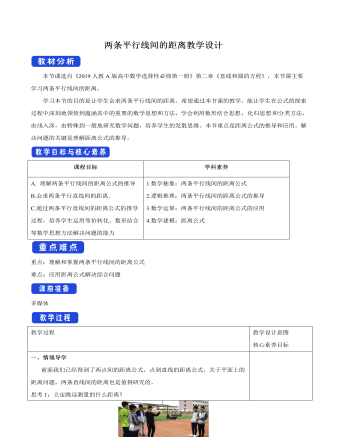
两条平行线间的距离教学设计人教A版高中数学选择性必修第一册
一、情境导学前面我们已经得到了两点间的距离公式,点到直线的距离公式,关于平面上的距离问题,两条直线间的距离也是值得研究的。思考1:立定跳远测量的什么距离?A.两平行线的距离 B.点到直线的距离 C. 点到点的距离二、探究新知思考2:已知两条平行直线l_1,l_2的方程,如何求l_1 〖与l〗_2间的距离?根据两条平行直线间距离的含义,在直线l_1上取任一点P(x_0,y_0 ),,点P(x_0,y_0 )到直线l_2的距离就是直线l_1与直线l_2间的距离,这样求两条平行线间的距离就转化为求点到直线的距离。两条平行直线间的距离1. 定义:夹在两平行线间的__________的长.公垂线段2. 图示: 3. 求法:转化为点到直线的距离.1.原点到直线x+2y-5=0的距离是( )A.2 B.3 C.2 D.5D [d=|-5|12+22=5.选D.]
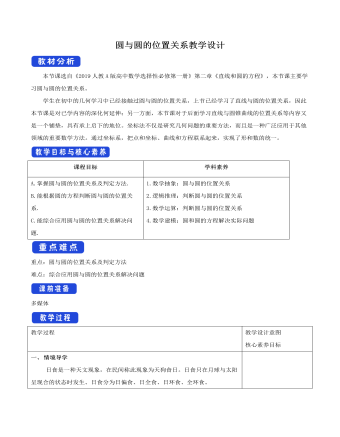
圆与圆的位置关系教学设计人教A版高中数学选择性必修第一册
1.两圆x2+y2-1=0和x2+y2-4x+2y-4=0的位置关系是( )A.内切 B.相交 C.外切 D.外离解析:圆x2+y2-1=0表示以O1(0,0)点为圆心,以R1=1为半径的圆.圆x2+y2-4x+2y-4=0表示以O2(2,-1)点为圆心,以R2=3为半径的圆.∵|O1O2|=√5,∴R2-R1<|O1O2|<R2+R1,∴圆x2+y2-1=0和圆x2+y2-4x+2y-4=0相交.答案:B2.圆C1:x2+y2-12x-2y-13=0和圆C2:x2+y2+12x+16y-25=0的公共弦所在的直线方程是 . 解析:两圆的方程相减得公共弦所在的直线方程为4x+3y-2=0.答案:4x+3y-2=03.半径为6的圆与x轴相切,且与圆x2+(y-3)2=1内切,则此圆的方程为( )A.(x-4)2+(y-6)2=16 B.(x±4)2+(y-6)2=16C.(x-4)2+(y-6)2=36 D.(x±4)2+(y-6)2=36解析:设所求圆心坐标为(a,b),则|b|=6.由题意,得a2+(b-3)2=(6-1)2=25.若b=6,则a=±4;若b=-6,则a无解.故所求圆方程为(x±4)2+(y-6)2=36.答案:D4.若圆C1:x2+y2=4与圆C2:x2+y2-2ax+a2-1=0内切,则a等于 . 解析:圆C1的圆心C1(0,0),半径r1=2.圆C2可化为(x-a)2+y2=1,即圆心C2(a,0),半径r2=1,若两圆内切,需|C1C2|=√(a^2+0^2 )=2-1=1.解得a=±1. 答案:±1 5. 已知两个圆C1:x2+y2=4,C2:x2+y2-2x-4y+4=0,直线l:x+2y=0,求经过C1和C2的交点且和l相切的圆的方程.解:设所求圆的方程为x2+y2+4-2x-4y+λ(x2+y2-4)=0,即(1+λ)x2+(1+λ)y2-2x-4y+4(1-λ)=0.所以圆心为 1/(1+λ),2/(1+λ) ,半径为1/2 √((("-" 2)/(1+λ)) ^2+(("-" 4)/(1+λ)) ^2 "-" 16((1"-" λ)/(1+λ))),即|1/(1+λ)+4/(1+λ)|/√5=1/2 √((4+16"-" 16"(" 1"-" λ^2 ")" )/("(" 1+λ")" ^2 )).解得λ=±1,舍去λ=-1,圆x2+y2=4显然不符合题意,故所求圆的方程为x2+y2-x-2y=0.

